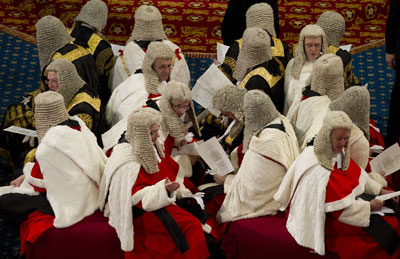New libel legislation proposed by the British government has been met with general approval by reform campaigners, who will now train their sights on further strengthening some aspects of the bill during the parliamentary process.
The Libel Reform Campaign hailed the draft bill–published by the Ministry of Justice on Friday–for its likelihood of “ending libel tourism and protecting free expression for journalists, writers, bloggers, and scientists around the world.” The campaign is a coalition of Index on Censorship, English PEN, and Sense About Science and has been calling for new legislation to reform libel laws since 2009.
“It is a major and historic piece of legislation, the first opportunity to overhaul libel laws in 20 years, so we are very excited by the potential for reform,” Robert Sharp, head of campaigns and communications at English PEN, told CPJ.
In recent years, London has been the libel capital of the world, with repressive governments and wealthy tycoons giving rise to “libel tourism” by filing suit there because current regulations favor claimants. The defendant is forced to demonstrate that the information published is true, unlike, for example, in the U.S., where the burden of proof lies on the claimant. And under the U.K.’s current regulations, a person suing for defamation does not have to prove that the material has caused them actual damage; it is often enough for the courts that it might. Under the new bill, future claimants would have to show that the material has caused them “serious harm.”
Critics say the high costs involved in defending a libel claim in the U.K. under current laws have often forced publications to settle out of court, even when the information under litigation was accurate.
Furthermore, journalists will now be protected by a statutory defense if they can show that their material is based on “honest opinion” or is “in the public interest,” according to the draft bill. The reform thus enshrines the principle of responsible publication in lieu of the so-called Reynolds defense, a historical common law privilege that protects publication of defamatory material if the information is in the public interest and the publisher has acted responsibly in checking its veracity. The reach of the Reynolds defense was restricted to precedents set by the courts, and media companies have traditionally complained about the inadequacy of such a framework.
However, several journalists have expressed concern about the limitations of the proposed reform. “The draft bill merely describes a modified version” of the Reynolds defense, “which is known to be unreliable, expensive, and confusing,” wrote Simon Singh, a scientific journalist and author, in the Guardian.
The bill aims to restrict libel tourism by excluding people who do not live in the U.K. or the European Union from being sued for libel in English or Welsh courts unless “England and Wales is clearly the most appropriate place in which to bring an action.” (England and Wales share one legal system, while Scotland and Northern Ireland have separate laws and courts). Libel tourism is of particular concern for press freedom groups, after cases such as that of Rachel Ehrenfeld, an Israeli-American journalist who published a book in New York in 2003 arguing that money from drug trafficking and wealthy Arab businessmen was funding terrorism. Ehrenfeld was sued in London by Sheikh Khalid bin Mahfouz, a Saudi businessman, according to the Libel Reform Campaign. Ehrenfeld’s case pushed the U.S. to pass a bill in 2010 to shield journalists and publishers from libel tourism by making such foreign court decisions unenforceable in the U.S.
“Libel tourism refers to a number of failings in the current law and represents a huge chill on reporting around the world, with many investigative journalists self-censoring for fear of libel prosecution in English courts,” Sharp said.
Campaigners in the U.K. have welcomed the new bill’s presumption that defamation trials held with a jury will be abolished, and that website operators will receive extra protection, with a special defense if they can prove they did not post the statement in question. However, Web hosts could lose protection if a claimant can show that it is impossible to identify the person who posted the material and the operator fails to respond to a notice of complaint. Also, critics have asked the government to further limit the ability of corporations to defend themselves using libel laws, an issue that will most likely emerge during upcoming discussions in Parliament.
“The new bill will ensure the threat of libel proceedings is not used to frustrate robust scientific and academic debate,” the Ministry of Justice stated.
The legislation will now be debated in the House of Commons and the House of Lords. The bill already includes recommendations from a joint committee of members of both chambers, published in October, and reform is supported by all parties, so it is expected to be adopted in the fall once the House of Lords has given its final reading.
